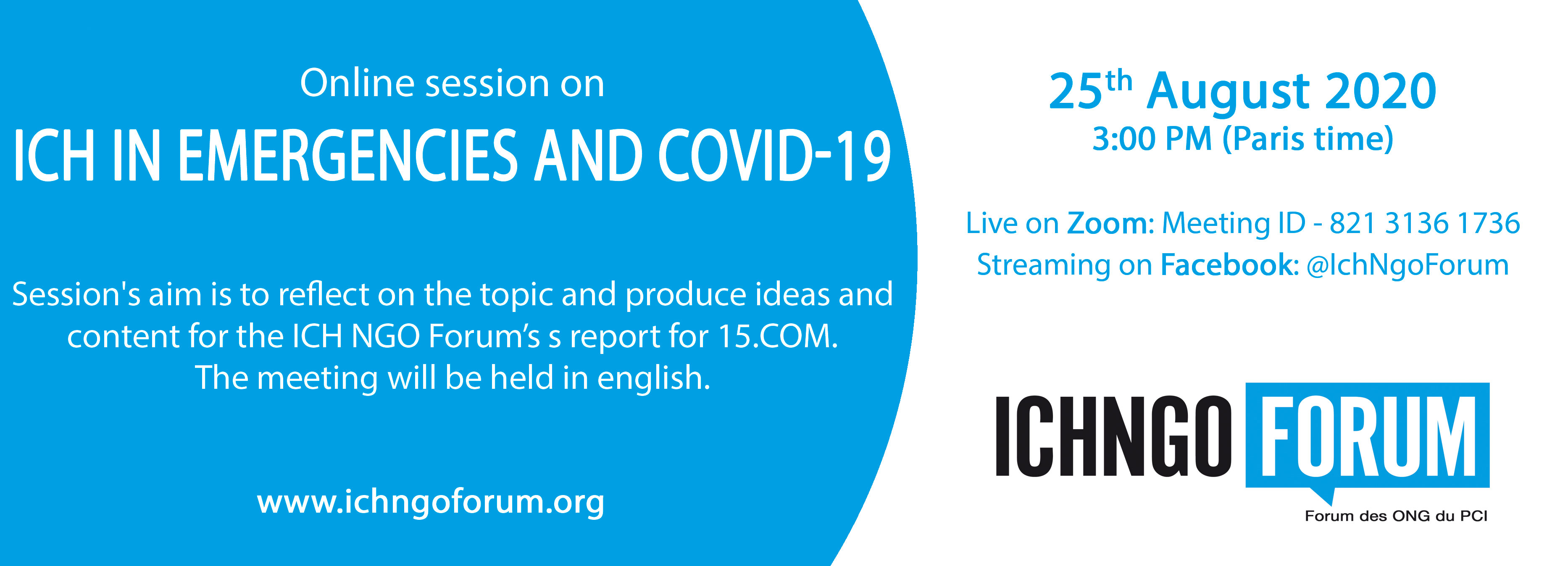 An online session on ICH in emergencies and Covid-19 will be held on 25th of August at 3:00 PM (Paris time). Session’s aim is to reflect on the topic and produce ideas and content for the ICH NGO Forum’s report for 15th Intergovernmental Committee for the Safeguarding of the Intangible Cultural Heritage. The session will be held as a Zoom-meeting. The meeting will be held in english.
An online session on ICH in emergencies and Covid-19 will be held on 25th of August at 3:00 PM (Paris time). Session’s aim is to reflect on the topic and produce ideas and content for the ICH NGO Forum’s report for 15th Intergovernmental Committee for the Safeguarding of the Intangible Cultural Heritage. The session will be held as a Zoom-meeting. The meeting will be held in english.
We have had two prelimenary meetings with the subcommittee members, and have produced a set of statements, which could work as a starting point for the discussion. Please read the statements and the question following each statement. On our session we will approach the topic using these questions as a frame for the discussion.
The session is open for representatives of accredited NGOs.
Link to the Zoom meeting: https://us02web.zoom.us/j/82131361736 (Meeting ID: 821 3136 1736). The session will be also streamed on the ICH NGO Forum’s Facebook Page.
For further information: Matti Hakamäki – Facilitator for the group C (ICH in emergencies and Covid-19) – ICH NGO Forum – matti.hakamaki@kaustinen.fi
THE STATEMENTS:
- It is widely accepted that ICH in emergencies (be they caused by natural disaster and/or armed conflict) can play dual role – both to pose a threat to the ICH itself and to serve as a powerful tool to help communities prepare for, respond to and recover from emergencies (cf. 14.COM 13). How ICH under COVID-19 fits into this model?
- Exchange of information, especially sharing of good practices, is of special importance when one needs to act speedily against the threat of the pandemic. How to improve ways to support exchange of information and sharing of good practices between NGOs?
- Many communities, groups and individuals cope with the pandemic by relying on, (re)turning to, or looking for resources and means in their immediate social, cultural and natural environment, demonstrating a self-sufficiency hooked with ICH. Can this help in achieving the sustainable development goals globally, and how it relates to the jurisprudence of the Convention and other statutory documents?
- Many ICH communities adapted to the pandemic by developing online methods of practicing, enacting, transmitting and safeguarding ICH. In principle, such methods represent a substitute for face-to-face interaction as a basis of ICH. Nevertheless, are there methods that can be taken as welcome novelties in the functioning of ICH in general, regardless of the specific current situation? What are challenges and opportunities of digital transition of ICH in the present and imagined future?
- The highest percentage (c. 40%) of responses to UNESCO’s call to share experiences in the context of COVID-19 pandemic was provided by ICH NGOs. Can this be taken as an indication of a trend towards more prominent presence of NGOs among main actors involved in the operation of the Convention on international scale? Is there similar trend happening on regional, national and local levels? Has this unfortunate situation helped better cooperation between ICH communities, NGOs and governments?

